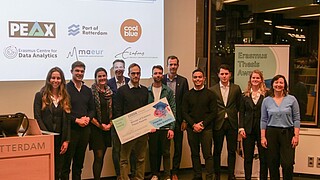Impressed by the originality of Antonio’s thesis, the jurors appreciated that it linked concrete supply chain strategies for climate change adaptation with resource dependency. In his winning thesis, Antonio Cambio (MSc International Management/CEMS 2021) provided an easy framework including the pros and cons of various adaption strategies. The information in his thesis could be applied practically by companies using supply chains.
Strengthening the links in the chain
Antonio’s thesis, Achieving Supply Security: How Resource-Dependent Firms Threatened by Climate
Risk Adapt to Climate Change, examines the intensified threat of vulnerable global supply chains by climate change. His study gives clear recommendations and investigates which strategies mitigate risks and increase resilience, from both social and environmental impact standpoints. His findings further suggest that bridging and buffering strategies should be combined to improve resilience against sudden supply chain disruptions and to decrease the overall vulnerability of wide supply chains.
For 16 consecutive years, the KPMG-RSM Sustainability Master Thesis Award has put business students’ efforts in the spotlight to address today’s pressing sustainability issues. Four main criteria have been used to assess the selected theses: academic excellence (a grade of 8.5 or higher); possible reception by companies; potential environmental and/or social impact; and originality.
Using a comprehensive and rigorous framework, an official student review team considered more than 1,500 master theses to create a shortlist of five to recommend to the jury of professionals who have numerous years of experience in the field of sustainability or corporate social responsibility: Lars Crama, Private Lead at Up!Rotterdam; Arjanne Hoogstad, Manager Marketing & Communication at Rotterdam Partners; Cécile Rozé, Manager Corporate Duurzaamheid at PGGM; and Jerwin Tholen, Chairman of the jury, Partner Sustainability at KPMG.
Cloud technology’s impact on corporate sustainability
Runner up Jonne van Gils, a 2021 graduate of RSM’s MSc Global Business Sustainability, described the effects of using an outsourced datacenter as a driver of customer sustainability in her thesis titled Is the Cloud the way to Green? Cloud Technology Impact on Corporate Sustainability. She provided clear guidelines and implications for choosing to use cloud technology. Furthermore, the jury noted that Jonne’s findings can be translated across a large range of companies, thereby potentially creating a large impact on a global scale.
Antonio won €1,000 and runner up Jonne won €500.
The other shortlisted award nominees and their thesis titles were:
- Bloeme Cohen (MSc Global Business & Sustainability) – Frugal innovation: a pathway to inclusive development? A study of fortified food in West Africa through a gender lens
- Darpana Vellanki (MSc Global Business & Sustainability) – How brands in the Dutch textile industry can build cascading networks for product life extension to create circular production and consumption systems
- Iris Budie (MSc Global Business & Sustainability) – Steering, structuring and governing sustainability in the dairy trading industry
The announcement and celebration of the winners included a slide show, comments from the jury and video presentations of the nominated theses.
KPMG-RSM Sustainability Master Thesis Award
KPMG is a global network of independent member firms offering audit, tax and advisory services. The firms work closely with clients, helping them to mitigate risks and grasp opportunities. KPMG member firms can be found in 145 countries and territories. Collectively, it employs more than 200,000 people across a range of disciplines. Sustaining and enhancing the quality of this professional workforce is KPMG's primary objective.
The annual KPMG-RSM Sustainability Master Thesis Award started in 2006 to honour work which combines academic excellence and business relevance in the subject of sustainability management. To qualify, thesis subjects must be related to social and ecological sustainability and have achieved a mark of at least 8.5 during the thesis defence. Theses from the past academic year are reviewed. A final shortlist presents five theses, chosen according to their academic excellence, socio-environmental impact, business relevance, and originality. The winner is picked by a select jury of external leaders working in the field of corporate sustainability.





